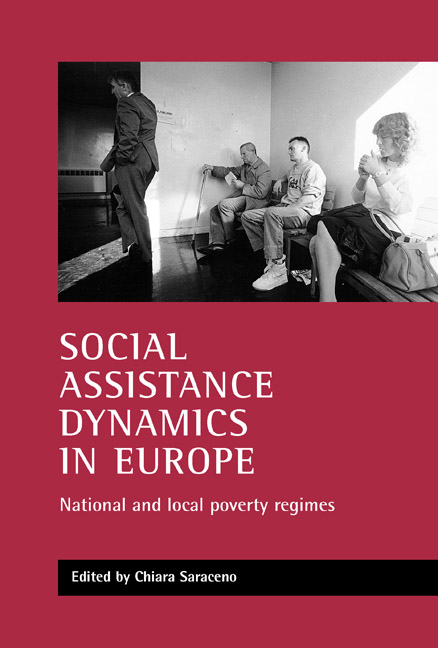Book contents
- Frontmatter
- Contents
- List of figures and tables
- Acknowledgements
- Notes on contributors
- one Introduction: exploring social assistance dynamics
- two Cities as local systems
- three Income support measures for the poor in European cities
- four Why some people are more likely to be on social assistance than others
- five Paths through (and out of) social assistance
- six Deconstructing the myth of welfare dependence
- References
- Appendix Institutional frameworks of income support policies in 13 European cities
- Index
five - Paths through (and out of) social assistance
Published online by Cambridge University Press: 20 January 2022
- Frontmatter
- Contents
- List of figures and tables
- Acknowledgements
- Notes on contributors
- one Introduction: exploring social assistance dynamics
- two Cities as local systems
- three Income support measures for the poor in European cities
- four Why some people are more likely to be on social assistance than others
- five Paths through (and out of) social assistance
- six Deconstructing the myth of welfare dependence
- References
- Appendix Institutional frameworks of income support policies in 13 European cities
- Index
Summary
Introduction
In this chapter we describe and analyse the dynamic pattern of social assistance support. The analysis is limited to those cities for which quantitative longitudinal data were available in the social assistance archives: Gothenburg and Helsingborg in Sweden, Bremen in Germany, Milan and Turin in Italy, Lisbon in Portugal, Barcelona and Vitoria in Spain. This means that the comparison covers fewer cities than in other chapters.
Building up the database was one of the main tasks of the ESOPO study. The existence of information covering a significant length of time has made it possible to retrace the full sequence of periods during which beneficiaries and their families received economic support. Our intention was to overcome the limits of static analyses of poverty. Although static information is of course useful, it does not permit an understanding of the dynamics of poverty, nor of the social assistance provided, and consequently it does not allow an adequate assessment of the efficacy of policies.
As pointed out in Chapter Four, and underlined in other studies, households receiving social assistance in the same city and at the same time may in fact find themselves in very different situations. While some may be experiencing a lapse into poverty, briefly interrupting a basic situation of economic independence, others may be subject to frequent lapses characterising a highly vulnerable life course, and others again may find themselves in a situation of chronic indigence.
Considering only the first episode of social assistance may therefore be highly misleading. Many people conclude a first period of support only to return later (often several times). An analysis restricted to a single episode does not allow the distinction between situations of occasional temporary economic difficulty and the numerous relapses experienced by those who do not have enough resources to free themselves from long-term reliance on social assistance (Leisering and Leibfried, 1999).
In order to overcome these limitations, we have created a harmonised micro-database that is more coherent with the conception of poverty as a dynamic phenomenon, both at the individual and household level. To our knowledge, this database is unique both for number of archives (and countries/cities) included and for the kind of dynamic analyses it allows. The different situations and dynamics have been observed and analysed by reconstructing ‘careers in social assistance’.
- Type
- Chapter
- Information
- Social Assistance Dynamics in EuropeNational and Local Poverty Regimes, pp. 173 - 234Publisher: Bristol University PressPrint publication year: 2002
- 3
- Cited by



